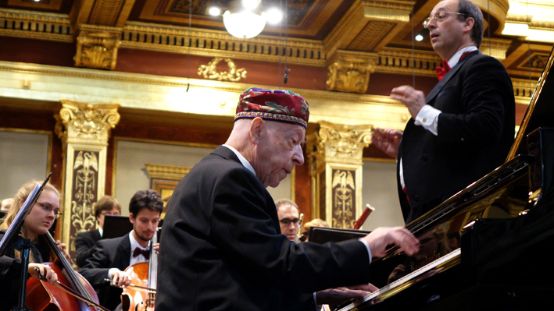United projects of the heart
Martin Studer was on tour with the Viennese pianist Paul Badura-Skoda and the Duo Praxedis and performed his version of Schubert's "Unfinished" for the first time.

For conductor and music teacher Martin Studer, music is a "school of life". This is especially true of his work with the New Zurich Orchestra, which he founded 25 years ago. The Viennese pianist Paul Badura-Skoda was certainly impressed by the freshness of the young musicians in this orchestra, which inspired his own playing as a soloist. The Duo Praxedis also sparkled with ideas when mother and daughter opened up new repertoire for this instrumentation on harp and piano. Each brought their own heartfelt concerns to a joint concert tour initiated by Studer to Graz, Vienna, Bern, Zurich and Zug.
For this occasion, Studer had united his New Zurich Orchestra with the highly motivated amateurs of the University of Bern Alumni Orchestra, with the aim of forming a productive whole from professionals and enthusiastic amateurs and thus enabling an intensive community experience. The plan worked and caused storms of applause - not only at the Vienna Musikverein! Bedřich Smetana's symphonic poem The Moldau made all the qualities of this constellation clear at the start: it's not about slick perfection, but all the more emotion.
Productive cooperation
Paul Badura-Skoda first played Mozart's C minor Piano Concerto K. 491 in the 1950s and has played it several times since then. So the almost 90-year-old pianist brought one of his favorite works into this great whole. Even during the last rehearsal, he gave clear instructions to the orchestra from the piano - for example, where the woodwinds could follow the melodic lines of the piano even more closely. So much productive cooperation clears the way for the magic of the moment! Badura-Skoda raises his voice on the Bösendorfer out of great drama. The effect is charismatic and forceful, at the same time deeply restful. This piano concerto in particular in such an interpretation shows that Mozart's music is much richer than simply "beautiful". Badura-Skoda expresses his thanks for the great applause with the fragile and playful Adagio for glass harmonica.
Praxedis Genviève Hug and Praxedis Hug-Rütti are as symbiotically committed to each other on the harp and piano as their family ties would suggest. Their productivity is exuberant and their natural enthusiasm exudes an infectious charm. For this concert program, they have breathed new life into the double concerto by the now little-known British early Romantic composer Elias Parish Alvars. Hardly any other music could convey Mozart's gesture more aptly and light-footedly. Not as ambivalent and profound as Badura-Skoda, the Praxedis ladies communicate with Studer's orchestra in a light-flooded and at times very waltz-like manner.
Thinking ahead and passing it on
But this is not enough of an ambitious project! Martin Studer has been working on Franz Schubert's Symphony in B minor, the so-called Unfinishedexplored. His love for the stirring melodies fueled his desire to redeem Schubert's late masterpiece from its incomplete status. So, after meticulous analytical work, he developed the existing material further. This ultimately resulted in a new third movement and a finale. Even when listened to critically, the result seems to have been cast from a single mold. Because one thing was particularly important to Studer: full respect for Schubert's musical language and no "interference" with his own ideas. The conductor and arranger confirmed in conversation: "I did everything the way I think Schubert would have done it."
Studer's conducting spurred everyone involved in this world premiere to top form at the Vienna Musikverein. The dark emotions are reliably captivating and build up to shattering climaxes. In the midst of all this turmoil, however, there is a great deal of tenderness - and the basis for this is not technical perfection but empathy.
During the interval discussion, Badura-Skoda, who will celebrate his 90th birthday in October, said that experienced musicians could pass on a rich treasure to the many younger "colleagues": "The torch must keep burning!"








